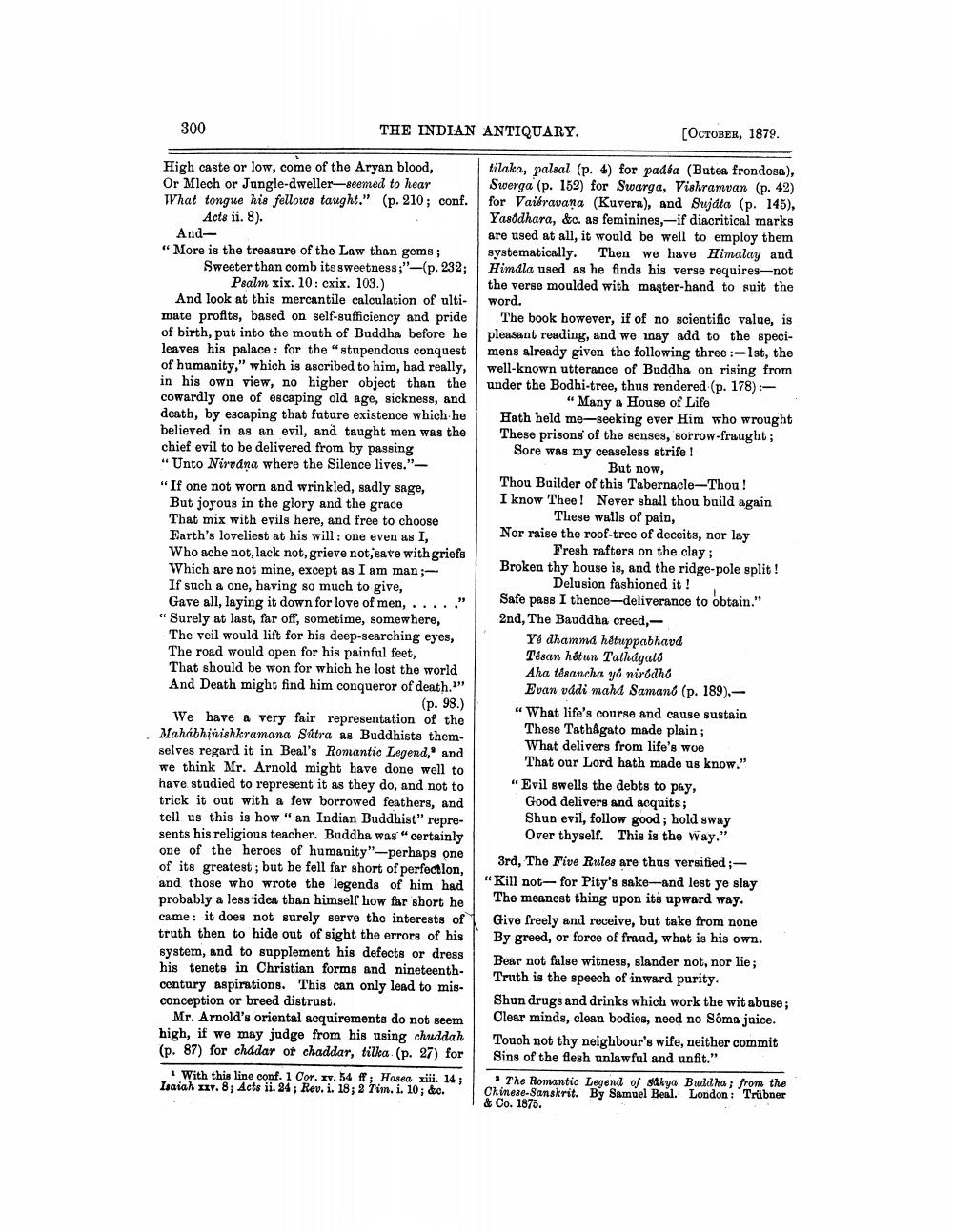________________
300
THE INDIAN ANTIQUARY.
High caste or low, come of the Aryan blood, Or Mlech or Jungle-dweller-seemed to hear What tongue his fellows taught." (p. 210; conf. Acts ii. 8). And
"More is the treasure of the Law than gems; Sweeter than comb its sweetness;"-(p. 232; Psalm xix. 10: cxix. 103.)
And look at this mercantile calculation of ultimate profits, based on self-sufficiency and pride of birth, put into the mouth of Buddha before he leaves his palace: for the "stupendous conquest of humanity," which is ascribed to him, had really, in his own view, no higher object than the cowardly one of escaping old age, sickness, and death, by escaping that future existence which he believed in as an evil, and taught men was the chief evil to be delivered from by passing "Unto Nirvana where the Silence lives.""If one not worn and wrinkled, sadly sage,
But joyous in the glory and the grace That mix with evils here, and free to choose Earth's loveliest at his will: one even as I, Who ache not, lack not, grieve not, save with griefs Which are not mine, except as I am man;If such a one, having so much to give, Gave all, laying it down for love of men, "Surely at last, far off, sometime, somewhere, The veil would lift for his deep-searching eyes, The road would open for his painful feet, That should be won for which he lost the world And Death might find him conqueror of death.""" (p. 98.) We have a very fair representation of the Mahábhinishkramana Sútra as Buddhists themselves regard it in Beal's Romantic Legend, and we think Mr. Arnold might have done well to have studied to represent it as they do, and not to trick it out with a few borrowed feathers, and tell us this is how "an Indian Buddhist" represents his religious teacher. Buddha was "certainly one of the heroes of humanity"-perhaps one of its greatest; but he fell far short of perfection, and those who wrote the legends of him had probably a less idea than himself how far short he came: it does not surely serve the interests of truth then to hide out of sight the errors of his system, and to supplement his defects or dress his tenets in Christian forms and nineteenthcentury aspirations. This can only lead to misconception or breed distrust.
Mr. Arnold's oriental acquirements do not seem high, if we may judge from his using chuddah (p. 87) for chadar or chaddar, tilka (p. 27) for
1 With this line conf. 1 Cor. xv. 54 ff; Hosea xiii. 14; Isaiah xxv. 8; Acts ii. 24; Rev. i. 18; 2 Tim. i. 10; &c.
[OCTOBER, 1879.
tilaka, palsal (p. 4) for padéa (Butea frondosa), Swerga (p. 152) for Swarga, Vishramvan (p. 42) for Vaisravana (Kuvera), and Sujata (p. 145), Yasodhara, &c. as feminines,-if diacritical marks are used at all, it would be well to employ them systematically. Then we have Himalay and Himala used as he finds his verse requires-not the verse moulded with master-hand to suit the word.
The book however, if of no scientific value, is pleasant reading, and we may add to the specimens already given the following three:-1st, the well-known utterance of Buddha on rising from under the Bodhi-tree, thus rendered (p. 178):"Many a House of Life
Hath held me-seeking ever Him who wrought These prisons of the senses, sorrow-fraught; Sore was my ceaseless strife!
But now, Thou Builder of this Tabernacle-Thou!
I know Thee! Never shall thou build again These walls of pain,
Nor raise the roof-tree of deceits, nor lay Fresh rafters on the clay;
Broken thy house is, and the ridge-pole split! Delusion fashioned it!
Safe pass I thence-deliverance to obtain." 2nd, The Bauddha creed,
Yé dhamma hétuppabhava Tésan hétun Tathagató Aha têsancha yo niródho
Evan vádi mahd Samand (p. 189),"What life's course and cause sustain These Tathagato made plain; What delivers from life's woe
That our Lord hath made us know." "Evil swells the debts to pay,
Good delivers and acquits;
Shun evil, follow good; hold sway Over thyself. This is the way."
3rd, The Five Rules are thus versified ;"Kill not- for Pity's sake-and lest ye slay The meanest thing upon its upward way. Give freely and receive, but take from none By greed, or force of fraud, what is his own. Bear not false witness, slander not, nor lie; Truth is the speech of inward purity.
Shun drugs and drinks which work the wit abuse; Clear minds, clean bodies, need no Sôma juice. Touch not thy neighbour's wife, neither commit Sins of the flesh unlawful and unfit."
The Romantic Legend of sakya Buddha; from the Chinese-Sanskrit. By Samuel Beal. London: Trübner & Co. 1875.




